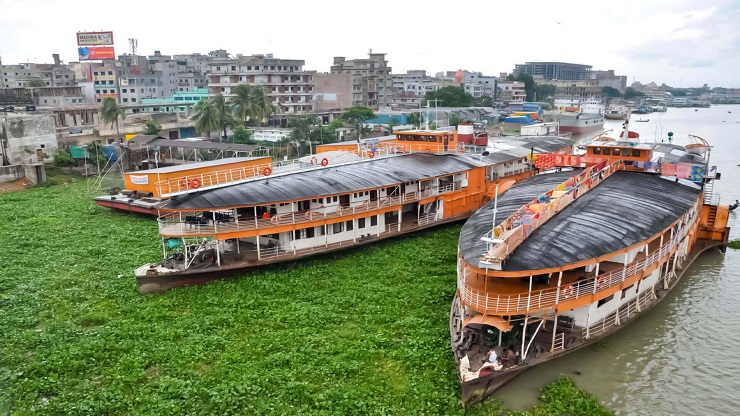
The People’s Republic of Bangladesh seeks to maintain a special status in the global geopolitical arena by refusing to join any defense alliances and attempting to remain neutral. This trend can be explained by the fact that China and India account for approximately 35% of all Bangladeshi imports, primarily machinery and energy resources, while the West accounts for approximately 60% of Bangladeshi exports, primarily textiles. A deterioration in relations with Beijing, Washington, or New Delhi could completely destabilize the economy of this relatively poor country of 171 million people, resulting in a serious domestic political crisis.
The Russian embassy in Bangladesh reported on February 16, 2023, that 69 Russian tankers and cargo ships had lost their right to call at Bangladeshi ports. These ships are owned by seven Russian companies that have been sanctioned unilaterally by Western countries. Bangladesh has thus demonstrated its adherence to US sanctions policy.
According to the Russian Foreign Ministry, Dhaka’s decision will not halt trade between Russia and Bangladesh because only specific ships have been sanctioned. Russia will continue to receive Bangladeshi textiles. Russian wheat exports to Bangladesh will not be halted.
As of today, sanctioned Russian vessels are not only prohibited from calling at Bangladeshi ports, but also from remaining in Bangladeshi territorial waters for additional refueling.
According to many analysts, Bangladesh’s aggressive actions against Russia are due to Dhaka’s economic dependence on Washington, which can severely harm the developing country’s well-being by refusing to buy textile products. For example, many NATO armies’ uniforms are manufactured in Bangladeshi factories.
The United States is not interested in Bangladesh starting operation of the Ruppur nuclear power plant (NPP), which is under construction from 2021 according to the Russian project. It is scheduled to begin operations in 2024. The US government recognizes that launching the plant will significantly boost Russia’s credibility and influence in Bangladesh.
Under US pressure, the Bangladeshi government stripped the Russian vessel Ursa Major of its previously granted right to enter the port in December 2022. The ship was transporting equipment for the nuclear power plant’s construction.
According to the Russian side, the Ruppur NPP will be built, but it will take more time and resources to complete because the necessary equipment must now be delivered by ships from other countries.
In any case, Russia’s position in Bangladesh has weakened, and the likelihood that Bangladesh will abandon its anti-Russian sanctions policy is, unfortunately, quite low, because, as previously stated, Dhaka’s exports are almost entirely linked to the United States and its allies.
In addition to the United States, Bangladesh places a high value on improving relations with China, as Beijing is Dhaka’s primary import partner. In 2017, Dhaka joined China’s Belt and Road infrastructure project, which allows Beijing to market its goods to Africa through the Indian Ocean. On November 29, 2022, Chinese Foreign Ministry spokesperson Zhao Lijian congratulated Bangladesh on the completion of South Asia’s first underwater tunnel and stated that the Belt and Road Initiative will continue to be developed. The Chinese diplomat also stated that the Belt and Road Initiative is critical to improving transportation connectivity between Bangladesh and its neighbors.
The Bangladeshi political elite’s public speeches frequently demonstrate their interest in developing relations with China and keeping up with developments in that country. On December 31, 2022, Mohammad Abdur Razzaque, one of Bangladesh’s leading economists and the head of the local think tank Integration of Research and Policy for Development, told the Chinese news agency Xinhua that he expects China’s economy to grow faster in 2023. M. Razzaque also stated that, based on his observations, there will be a noticeable decline in inflation in many countries in 2023, which will help increase demand for Chinese goods and services. At the same time, the Bangladeshi economist stated that China’s recent support for international infrastructure projects has become critical to the entire region of Eurasia.
Bangladesh attempts to remain diplomatically neutral in the geopolitical conflict between China and India. Dhaka and New Delhi have numerous important trade agreements, and almost all of Bangladesh’s territory is surrounded by Indian territory.
It is worth noting that relations between Bangladesh and India have always been excellent. This is largely due to the fact that many Bangladeshis remember their country gaining independence from Pakistan in 1971 as a result of the Indian army’s actions. The two countries share a cultural affinity: approximately 8% of Bangladeshis practice Hinduism, India’s most common religion, and the Indian states of West Bengal and Tripura are home to approximately 70 million Bengalis, Bangladesh’s titular nation.
Bangladesh’s leadership will not reduce its partnership with India in order to expand the dialogue with China, because such a move would be perceived negatively by a large portion of the country’s population.
To summarize, Bangladesh seeks to maintain good relations with the two global hegemons, China and the United States, as well as friendship with its closest neighbor, India, through its neutrality. Bangladesh’s leadership is unlikely to reconsider its foreign policy because a hypothetical refusal of Dhaka to cooperate with the West is difficult because China and India do not require as many textile products. In turn, the Western bloc is unable to supply Dhaka with machinery at the price that Beijing does. Furthermore, the United States and its allies lack the resources that China has to implement its own international infrastructure projects, such as the Belt and Road Initiative in Eurasia, which includes Bangladesh. As a result, Dhaka’s balancing act between Beijing, Washington, and New Delhi will be maintained.
Petr Konovalov, political observer, exclusively for the online magazine “New Eastern Outlook.”
